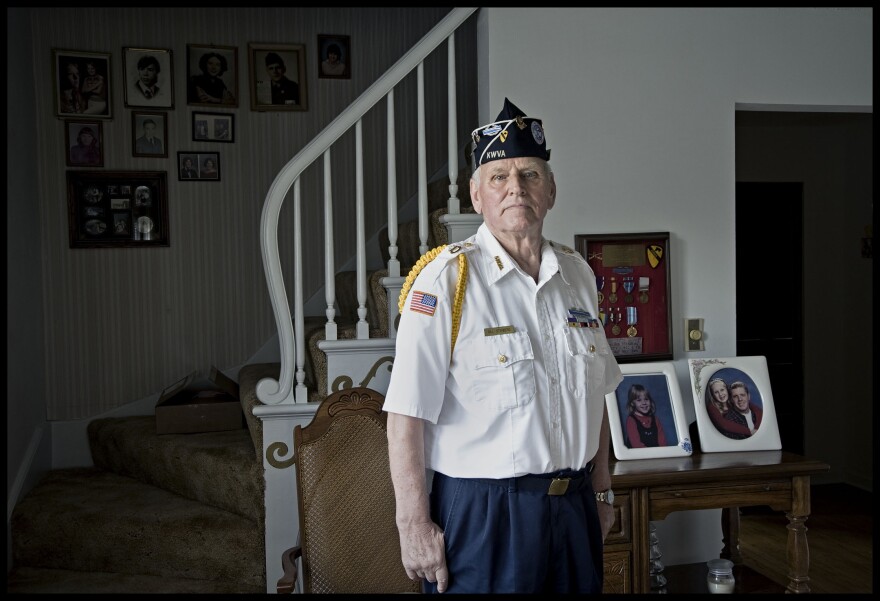Some veterans feel like they can't discuss their combat experiences, but a new art exhibit gives them voice.
Veterans have received different responses when they returned home. Some veterans, particularly those from World War II and Korea, were greeted with pomp and parades and then transitioned quietly into routine life. Others, from Vietnam to today's veterans of the wars in Iraq and Afghanistan, have found the transition difficult and a public tuned out to their needs.
But there is one thing many veterans have in common:
“I was really struck by how across all these generations of veterans, there was a common feeling of how their stories were unheard,” says Ben Calhoun.
Calhoun is a producer and contributor for WBEZ’s This American Life. His father, Paul, is a Milwaukee-based documentary photographer. They decided to combine their talents to help share veterans' stories.
After The Wars – Stories and Images of America’s Combat Veterans is an exhibit of photographs and recorded interviews with ten combat veterans of wars from WWII to Afghanistan. It’s currently on view at the Unitarian Universalist Church West in Elm Grove in the church’s Community Room Art Gallery. The exhibit will run through May 30th.
The show documents the stories of some of America’s combat veterans that might not otherwise be told.
"There was a common denominator of people feeling like, of not being asked, of not being heard and of not being able to express clearly what this experience had been like for them," Ben Calhoun says. "As the project went on, I know that for me it became a huge motivator to try and create the most loyal version of people's stories in an intimate way that they really gave me the privilege of hearing and capturing."
The Calhouns conducted oral histories with veterans in the area. They wanted the interviews to be regional in scope, but widely varied over generations and demographics of veterans.
The elder Calhoun says he found some interviews difficult to conduct. With certain generations of soldiers, especially those who fought in WWII, he says they had a harder time opening up.
“When you are looking for people who are going to do oral history types of things, not only do they need to have an interesting story to tell, but they need to be able to articulate that in an interesting way,” Paul Calhoun says.
Paul also wanted to add a unique element to telling the veterans' stories - photographing and documenting their current lives.
“I went and pretty much followed them throughout their daily experience, which is quite different from their combat experience, which I think brings another dimension to that," he says, "because in a lot of ways the interviews are about not only the combat experience but how people have adapted to civilian life after the conflicts that they were in.”
At the exhibit, visitors will be given headphones and CDs to listen to the stories being told directly to them by the veterans while viewing the photographs. Paul Calhoun says he hopes this gives a sense of intimacy and closeness to the veteran.
“A lot of times we hear the clichés ‘they fought for our freedom’ and ‘we thank them for their service,’ but it goes much deeper than that," Paul Calhoun says. "We’re talking about a lifetime that’s been changed by what they’d done in the service.”

The Calhouns worked with Dennis Johnson, Director of Milwaukee Homeless Veterans Services, to find veterans to interview. Johnson says veterans have always struggled to readjust to civilian life after combat, but each generation has handled the problem differently.
"Getting these kind of stories out there, veterans relate more to other veterans," Johnson says. "Where somebody might be holding something inside of them...Every veteran has their own experience and their own story, but knowing that there are other veterans that they can talk to on the same level that have experienced something like that, it's really the way to healing, is getting it out from inside of you."
Johnson is also one of the profiled veterans.
Additional interviews with veterans can be found here.
(Edited by Stephanie Lecci)






